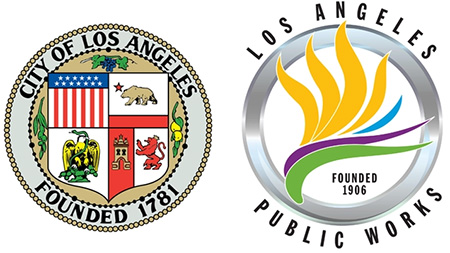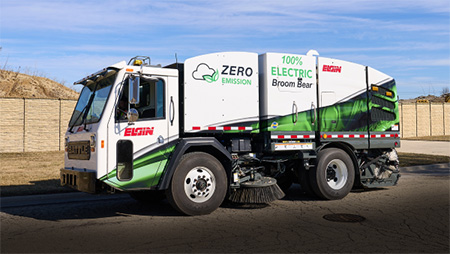LA Purchases Mechanical Broom EV Sweeper for City Streets: Is it the Right Technology? |

On April 11, 2024, Los Angeles City officials Thursday unveiled a "first of its kind" electric sweeper, Elgin Sweeper's EV Broom Bear, in an effort to reduce the impact of climate change and electrify the city's equipment.

by Ranger Kidwell-Ross, Editor
Los Angeles City officials recently showcased a new electric street sweeper, the EV Broom Bear, as part of their commitment to combat climate change and transition to a carbon-free city.
The unveiling was led by Councilman Bob Blumenfield, General Services Department General Manager Tony Royster, and StreetsLA General Manager Keith Mozee. The EV Broom Bear, developed in collaboration with Haaker Equipment and Elgin Sweeper companies, represents a significant investment in decarbonization efforts, with Los Angeles leading the charge in funding such initiatives. 1 2 However, the choice of a mechanical broom sweeper – even a superior quality Broom Bear – for sweeping city streets raises questions regarding the effectiveness of mechanical broom sweepers in removing smaller, more polluted micron particles. While mechanical broom sweepers like the Broom Bear are adept at picking up large debris, broom-only sweepers are considered to be less efficient at collecting fine particulate matter when compared to air sweepers. Studies have indicated that air sweepers, which utilize suction, are more effective at removing smaller particles that often carry a higher concentration of pollutants. These fine particles, typically 250 microns or smaller, are associated with increased respiratory issues and contribute significantly to stormwater runoff pollution. Mechanical broom sweepers, which rely on a conveyor belt system without a suction component, struggle to retain these smaller materials. In some cases, the action of the broom may even break down larger particles into smaller ones, which are then left on the street, potentially exacerbating pollution during subsequent wind or rain events. Given the environmental impact and the city's sustainability goals, WorldSweeper believes it may have been more prudent for Los Angeles to consider air sweepers operating on alternative fuels like compressed natural gas (CNG) or liquefied natural gas (LNG). These sweepers have a smaller carbon footprint and are more adept at removing the more polluted small micron particles. While Los Angeles' efforts to transition to electric vehicles and clean energy are commendable, the choice of an electric mechanical broom sweeper for city street maintenance may not be the most environmentally effective option available. WorldSweeper recommends for the city to explore air sweeper technologies that can provide a more comprehensive cleaning solution, particularly for fine particulate matter, to align with its environmental objectives. To learn more about choosing which type of sweeper would tend to be most effective at any particular pavement sweeping task, choose any/all of the link numbers at the end of this sentence to view many sites on the internet that discuss choosing a sweeper type; some number of these offer supportive information for the views of WorldSweeper in this article. 3 4 5 6 7 8 9 10 11 12 13 14 15 16 |
© 2005 - 2024 World Sweeper
|
Street Contents
|